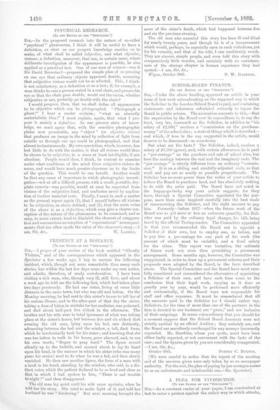PSYCHICAL RESEARCH.
[TO THE EDITOR OF THE 'SPECTATOR.") Sun—In the proposed research into the nature of so-called "psychical" phenomena, I think it will be useful to have a definition, as clear as our present knowledge enables us to make, of what shall be called subjective, and what objective, visions; a definition, moreover, that can, in certain cases, where deliberate investigation of the appearance is possible, be also applied as a practical test. One of our men of science—was it Sir David Brewster ?—proposed the simple plan of so pressing on one eye that ordinary objects appeared double, assuming that subjective visions would not be so affected. This, I think, is not satisfactory, as a definition or as a test ; if, for example, a man thinks he sees a person seated in a. real chair, and presses his eye so that the chair goes double, would not the vision, whether subjective or not, probably go double with the chair ? .
I would propose, then, that we shall define all appearances to be objective which can be photographed. "Photograph a ghost !" I hear a reader exclaim ; "what an absurdly materialistic idea!" I must explain, again, that what I pro- pose is mainly a definition. In our present state of know- ledge, we must agree that, with the sensitive photographic plates now procurable, any "object " (or objective vision) that produces an image in the mind by reflection of light from outside us through our eye could be photographed, and that almost instantaneously. My own conviction, which, however, has but little to do with the matter, is that all visions would thus be shown to be subjective, in a sense at least intelligible, if not absolute. People would then, I think, be content to examine under what conditions of the mind these subjective visions do occur, and would have much greater clearness as to the limits of the question. This would be one benefit. Another would be that any cases of imposture in which photographic investi- gation—not at all a difficult process, with a small, portable, dry. plate camera—was possible, would at once be separated from visions of the subjective kind, and confusion saved by applica- tion of further material tests. Finally, I must in such s matter as the present repeat again (I), that I myself believe all visions to be subjective, as above defined.; and (2), that the main value of the above is as a definition, which may give a clearer con. ception of the nature of the phenomena to be examined, and so may, to some extent, tend to diminish the element of exaggera- tion and, unconscious assumption of "supernatural" accompani- ments that too often spoils the value of the observer's story.—I


































 Previous page
Previous page